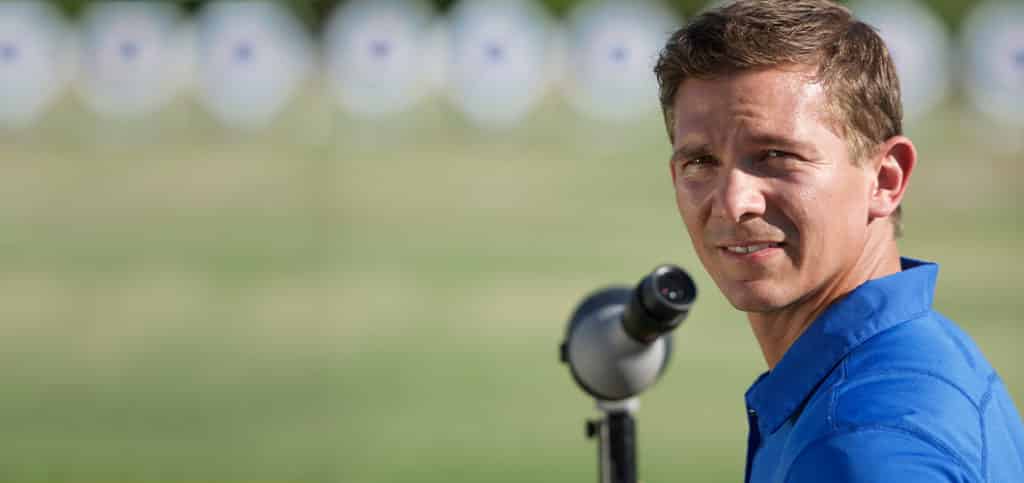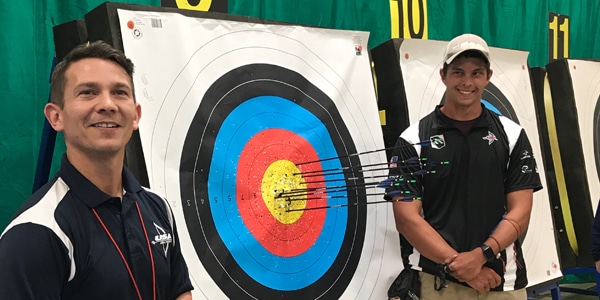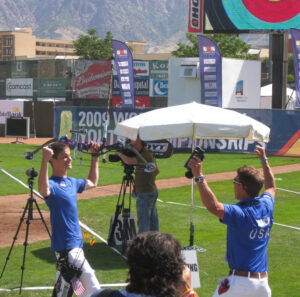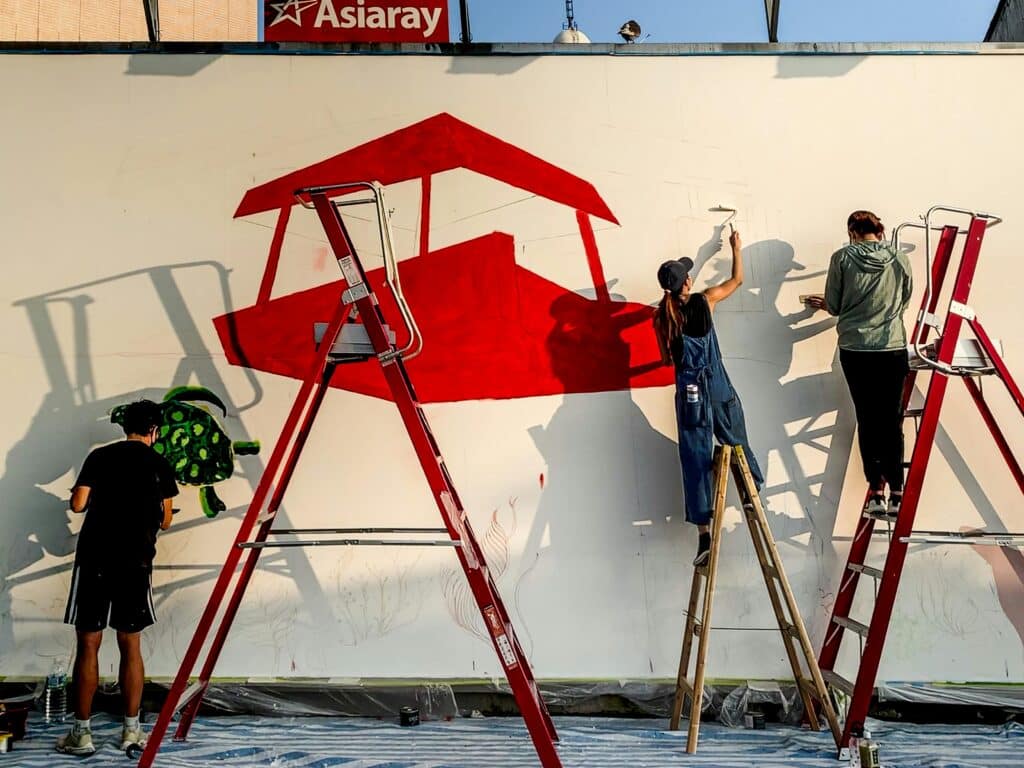How to Develop A Growth Mindset: 5 Ways to Harness its Strength

USA Archery Training and Education Manager Richard “Guy” Krueger specializes in encouraging athletes and coaches alike to be uncomfortable and grow. He shared his insights, tips and stories of leadership.
Guy Krueger’s kids sometimes wake up in the middle of the night screaming in pain. The pain is real, but the cause is common. They have growing pains. Guy reassures them and reminds them that as much as they hurt, those pains are a good thing and mean that they are growing. For business leaders focused on how to develop a growth mindset, it can be painful at times, but it is a powerful driver of success.

Guy Krueger (left), USA Archery Training and Education Manager, teaches others the power of a Growth Mindset.
Krueger, currently the USA Archery Training and Education Manager, could be called an expert in growing pains. He was USA Archery’s High-Performance Manager and an Assistant Head Coach from 2012-2016, after achieving the highest levels in the sport as an athlete. He’s experienced the pain of narrowly missing out on a spot on the Olympic team as an athlete three times, and once as a coach, before finally being chosen as a coach for the 2016 Olympic team.
He is quick to admit that only through the pain and pivots of his journey has he been able to get to where he is now.
People who understand how to develop a growth mindset believe that talent is simply a starting point and that abilities can be developed through dedication and hard work. It’s the difference between saying “I’m not a good coach” (fixed mindset) and “I’m not a good coach YET” (growth mindset).
Krueger specializes in encouraging athletes and coaches to be uncomfortable and grow, to push their boundaries and become better. Similarly, you can leverage his tips and stories of leadership to manage change, develop resilience and grow as a leader.
1. Prepare for the Unexpected
“I grew up with the attitude that if you work hard enough at something, you could accomplish whatever you wanted. And so, when it came to archery, that’s how I approached it.” As a freshman in college, Krueger decided that he would win the collegiate world championships. And he did! He won the gold medal at the 2000 World University Championships and the bronze at the 2002 World University Championships. He also won a variety of other medals at the 2003 Pan Am games and the 2005 US Open.
The real magic in Krueger’s approach came from not just envisioning a positive outcome, but practicing mental and physical responses to when things go wrong. This growth mindset is central to how he approaches training and life.
For example, he knows that pressure and nerves during a competition make your heart rate increase more than in practice. Therefore, to simulate this elevated heart rate, he would do squats during archery practice to make sure that he was feeling the same physical conditions that he would experience during competition.
As a coach and leader in USA Archery, he uses this same perspective to make sure his coaches and athletes are prepared for anything. Krueger pushes his team to visualize “do or die” situations. He asks them, “How would you act if this situation were the difference between going to the Olympics and staying home? How will you act when things don’t go as planned?”
“In my mind, it’s the only way to be thorough in your planning,” says Krueger.
2. Be on the Same Side

One of the most powerful ways to encourage the members of your team to adopt a growth mindset is by sitting on the same side of the table — literally and figuratively.
Krueger underlines the importance of pulling up a chair alongside one of his athletes or coaches and saying “We’re in this together. Now what can we learn from this?” If you sit across from someone and tell them what they can improve on they are likely to get defensive.
When you sit beside them and talk, your message is more likely to be well received and it’s easier to communicate the positive nature of growing through making mistakes.
3. Focus on Self-Awareness
When thinking of how to develop a growth mindset, self-awareness is critical. You must first recognize the areas in which you need to improve.
Krueger has no doubt that his lack of self-awareness lost him a spot as a coach on the Olympic team in 2012. His focus had shifted away from selfless concern for his athletes’ success and towards the selfish desire to be chosen as a coach for the 2012 U.S. Olympic team.
Of course, in the moment, this wasn’t obvious to him. “I think my goal had shifted from wanting to help athletes to wanting to go to the Olympics as a coach.” But his athletes noticed: they chose a different assistant coach even though Krueger had spent the most time coaching them.
Not being chosen felt like a “slap in the face,” but it took Krueger another two years of work and education on self-awareness and mindfulness to become aware of his weaknesses in communication.
And the work paid off! When the 2016 Olympics came around, Krueger was selected as a coach and team leader by his athletes. Unfortunately, a month before the Olympics, the U.S. Olympic Committee decided to shift his spot as a coach on the overall U.S. Olympic team to another sport that they decided needed another coaching spot on the team.
“Self-reflection played an important role in helping me overcome that setback,” says Krueger. “Through that, I realized that I was truly interested in helping people.”
Now, as the Training and Education Manager, he’s able to directly impact over 20,000 archery coaches each year by leading all aspects of their training through the USA Archery organization.
4. Be Vulnerable
“Any time a leader makes a mistake and acknowledges it, people let their guard down…now they’re willing to learn,” says Krueger.
Showing your vulnerability as a leader and admitting that you made a mistake has the ability to bring down even the strongest of walls between you and others.
“Coaches often have a wall up. They come across as invincible, know everything, are perfect and never make mistakes.”
Krueger is sure to point out when he makes an error – whether it’s in the middle of a presentation or on a course.
For coaches who are especially resistant to recognizing their mistakes, Krueger will force them to experience a growth mindset. When he’s teaching a course or giving a presentation for other coaches, he’ll call on someone to respond to a question. If they answer incorrectly, he models what it looks like to use this as an opportunity to grow.
“Instead of saying, “Ah, that’s not right,” or shaming that person in any way, I always just transition it and say, “Alright, who wants to build on that?”
Small actions like the way he responds to mistakes in class can begin to model that mistakes are critical for growth.
- Read More: Take Our Growth Mindset Quiz
5. Practice Active Listening
As a leader, just listening can be your most powerful tool for gaining authority and getting people on your side.
“Coaches, managers and leaders sometimes forget that just listening often is more effective than talking or doing.”
This is especially true in situations where members of your team are resistant to change. Listening is key!
“Listen to what they had to say and instead of trying to argue a point. Listen to them and then just have a very frank conversation about it.”
The Bottom Line on How to Develop a Growth Mindset
None of this is easy. Listening can be hard. Showing vulnerability as a leader can be incredibly uncomfortable. But like those growing pains of your youth, all of these are necessary for your growth and success as a leader. Krueger models this: when asked if he has reached success as a leader, he answers “I’m not there yet. I’m still growing.”
Partner with WDHB and Experience to Lead to learn more valuable leadership lessons from elite athletes and coaches that you can apply to your organization. If your team desires to be more agile and resilient, contact us to learn more about customizing the interactive, virtual Resilient Leader Experience or the on-location Gold Medal Leadership Experience.
Author
Subscribe to get Access to Exclusive Content





